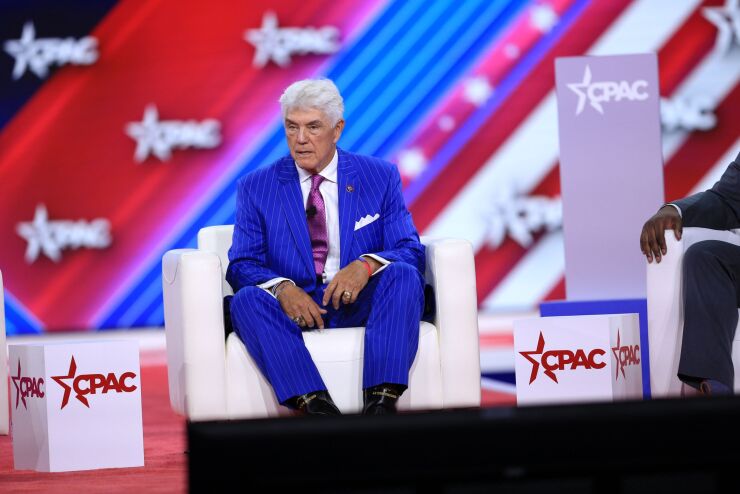The Small Business Administration may loosen a central underwriting requirement for loans under its 7(a) and 504 loan-guarantee programs by permitting borrowers to self-certify they are unable to obtain a conventional loan, according to House Small Business Committee Chairman Roger Williams.
"We're hearing that the SBA is considering changing the standard operating procedure to allow for businesses to self-certify they could not find any credit elsewhere in the private sector," Williams, R-Texas, said last week during a hearing of the Small Business Committee's Oversight Investigations and Regulations Subcommittee.
Williams called the idea of credit-elsewhere self-certification a "major departure" from SBA's current practice, where the lender makes the certification and can be held accountable if it is determined later a borrower had other financing options.
"After what we just came through with [the Paycheck Protection Program and the Emergency Injury Disaster Loan Program], I don't see how we could be relying on any self-certification," SBA Inspector General Hannibal Ware said at the April 19 subcommittee hearing in response to Williams' comment. "I believe it adds significant risk and we have the evidence and experience to know that it does."
Self-certification is a sensitive topic. Congress allowed borrowers to self-certify their eligibility for the PPP, which was

Christalyn Solomon, public affairs specialist for the SBA, acknowledged the agency is working on revising its standard operating procedures but declined to say whether credit-elsewhere self-certification would be included in the update.
"Details surrounding these changes are not yet publicly available," Solomon wrote Monday in an email.
Ware's strong opposition to self-certification "surprised" Williams, a spokesman for the Republican majority on the Small Business Committee wrote Monday in an email to American Banker. The committee intends to take a "deeper dive" into the issue "and will look to see if there are ways the process can be improved upon to ensure SBA programs are not being abused by ineligible entities," the spokesman added.
Ensuring small-business borrowers cannot qualify for conventional credit has always been a prerequisite for an SBA-backed loan. Kristen Dickey, an attorney who focuses on government-guaranteed lending at Starfield and Smith in Maitland, Florida, described credit elsewhere as a "foundational test" that "justifies the need for SBA financing" in a blog post from September.
While SBA has never permitted self-certification, it has previously amended other aspects of its credit-elsewhere guidelines. In 2018, it amended a condition that required lenders to analyze the liquid assets of owners of more than 10% of an applicant, boosting the threshold to 20%.
Talk of self-certification comes at a time of significant flux for SBA's 7(a) and 504 programs. Earlier this month, the agency approved a major change to its flagship 7(a) loan guarantee program, ending a four-decade moratorium on approval of new licenses for nondepository small-business lending companies, or SBLCs. As things stand, 7(a), which approved nearly 48,000 loans in the agency's 2022 fiscal year, is dominated by banks and credit unions, with just 14 nondepository SBLCs licensed to participate. The rule
Additionally, the agency overhauled the criteria for 7(a) and 504 loans that lenders must consider before originating them. It scaled back the number of factors lenders had to consider from nine to three: an applicant's credit score or credit history, cash flow and collateral.
Among the factors that were eliminated: evaluation of a borrower's character, experience and depth of management and the probability of long-term success.
SBA aims to streamline its programs, particularly 7(a), with an eye toward improving access to capital for underserved groups, according to James Ballentine, CEO of Ballentine Strategies, a consulting firm in Washington, D.C.
"I know that's been a goal" for SBA Administrator Isabella Casillas Guzman, Ballentine said in an interview.
But there are risks to SBA's approach, Ballentine added. In addition to the possibility of fraud, which Ware alluded to in his testimony, credit-elsewhere certification could trigger a spike in interest among legitimate businesses. Demand "could explode fairly quickly beyond [7(a)'s and 504's] authorization levels," Ballentine said.
The 7(a) program is already on pace to eclipse the lending volume record set in fiscal year 2022, when SBA approved loans totaling $25.7 billion. Through Tuesday, SBA had approved loans totaling $14.4 billion. At the same point in 2022, approvals totaled $12.3 billion. SBA is authorized to approve $35 billion of 7(a) loans in fiscal 2023, which ends Oct. 1.
Lawmakers also doubled down on their previous criticism of SBA's decision to cease collection efforts on unforgiven PPP and economic injury disaster loans of $100,000 or less, despite concerns about rampant fraud in both programs.
"The SBA does not seem to care about recouping these funds," Rep. Beth Van Duyne, R-Texas, said at the April 19 hearing. "By deciding not to collect on PPP and EIDL loans below a threshold, they've chosen to give a free pass to fraudsters."
Citing data from its attempts to recoup defaulted small-dollar 7(a) loans, which yielded little in the way of collections, SBA has argued similar efforts directed toward emergency COVID loans don't make economic sense.
House Republicans appear unswayed. Van Duyne mentioned the possibility of drafting legislation requiring SBA to collect on all outstanding PPP and economic injury disaster loans. "All legislative options are being explored," the Republican's spokesman stated.
SBA estimates the total of unforgiven PPP loans of $100,000 or less is approximately $2.9 billion. Van Duyne estimated the amount of uncollected economic injury disaster loans of $100,000 or less to be about $71 billion, although SBA has not provided an official figure.






